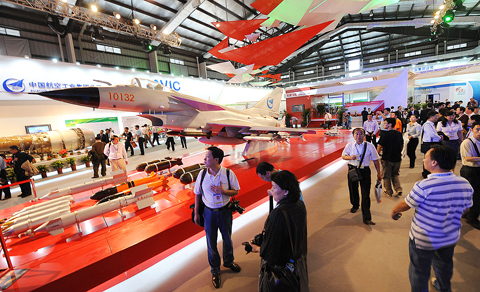China’s fledging aerospace industry took a major leap forward yesterday at the nation’s only international air show as it announced its first sale of commercial aircraft to a US company.
The Commercial Aircraft Corp of China (CACC, 中國商用飛機公司) confirmed the sale of five homemade jets to the aircraft leasing arm of General Electric with an option for the firm to buy 20 more, the two companies said in a statement.
The contract, signed on the sidelines of Airshow China in Zhuhai, makes GE Commercial Aviation Services the first overseas leasing firm to buy a Chinese-made commercial plane, they said.

PHOTO: AFP
Delivery of the ARJ21s (Advanced Regional Jet for the 21st Century) will start in 2013, the statement said, which was unable to confirm reports that the contract would be worth US$735 million.
“The ARJ21 will help fulfill the growing need within China for fast, efficient regional air travel,” said Norman Liu, executive vice president of GE Commercial Aviation Services, in the statement.
The ARJ21, which carries between 70 and 90 passengers, and other jets to be produced by CACC, are widely seen as part of a Chinese plan to eventually rival the dominance of Airbus and Boeing.
“To fly Chinese large aircraft in the blue sky is not just the will of the government, but the whole nation,” CACC chief Jin Zhuanglong (金壯龍) told an aviation conference in Zhuhai on Monday.
Moreover, the Aviation Industry Corp of China, a key backer of CACC, plans to acquire a foreign aircraft manufacturer, the state-run China Daily said yesterday, citing Tan Weidong (譚衛東), president of one of the firm’s subsidiaries.
Despite the lofty ambitions, China’s government and CACC have been keen to stress that the target of producing bigger planes to rival the global giants is a long-term goal that will take until at least 2020.
US-based Boeing and Airbus of Europe headed around 600 civil and military manufacturers, suppliers and designers who gathered in Zhuhai for the biennial Airshow China, which lasts until Sunday.
Airbus said yesterday it had secured an order for 20 of its A320 aircraft from the aviation leasing arm of the Bank of China (中國銀行).
Major manufacturers remain bullish about the long-term demand for new aircraft in China despite the global financial meltdown.
Airbus chief operating officer John Leahy said the downturn in the aviation industry “might not be as bad as people are forecasting.”
“We are not seeing a lot of order cancellations ... And even if the traffic is down, aircraft sales may still be up,” he said, adding that airlines will still need to replace old planes to save cash from fuel prices.
However, there are early signs China has not escaped the drop-off that has hit the global industry, with both analysts and airlines warning of a “cold winter” of slowing passenger demand following several years of double-digit growth.

MORE VISITORS: The Tourism Administration said that it is seeing positive prospects in its efforts to expand the tourism market in North America and Europe Taiwan has been ranked as the cheapest place in the world to travel to this year, based on a list recommended by NerdWallet. The San Francisco-based personal finance company said that Taiwan topped the list of 16 nations it chose for budget travelers because US tourists do not need visas and travelers can easily have a good meal for less than US$10. A bus ride in Taipei costs just under US$0.50, while subway rides start at US$0.60, the firm said, adding that public transportation in Taiwan is easy to navigate. The firm also called Taiwan a “food lover’s paradise,” citing inexpensive breakfast stalls

TRADE: A mandatory declaration of origin for manufactured goods bound for the US is to take effect on May 7 to block China from exploiting Taiwan’s trade channels All products manufactured in Taiwan and exported to the US must include a signed declaration of origin starting on May 7, the Bureau of Foreign Trade announced yesterday. US President Donald Trump on April 2 imposed a 32 percent tariff on imports from Taiwan, but one week later announced a 90-day pause on its implementation. However, a universal 10 percent tariff was immediately applied to most imports from around the world. On April 12, the Trump administration further exempted computers, smartphones and semiconductors from the new tariffs. In response, President William Lai’s (賴清德) administration has introduced a series of countermeasures to support affected

CROSS-STRAIT: The vast majority of Taiwanese support maintaining the ‘status quo,’ while concern is rising about Beijing’s influence operations More than eight out of 10 Taiwanese reject Beijing’s “one country, two systems” framework for cross-strait relations, according to a survey released by the Mainland Affairs Council (MAC) on Thursday. The MAC’s latest quarterly survey found that 84.4 percent of respondents opposed Beijing’s “one country, two systems” formula for handling cross-strait relations — a figure consistent with past polling. Over the past three years, opposition to the framework has remained high, ranging from a low of 83.6 percent in April 2023 to a peak of 89.6 percent in April last year. In the most recent poll, 82.5 percent also rejected China’s

PLUGGING HOLES: The amendments would bring the legislation in line with systems found in other countries such as Japan and the US, Legislator Chen Kuan-ting said Democratic Progressive Party (DPP) Legislator Chen Kuan-ting (陳冠廷) has proposed amending national security legislation amid a spate of espionage cases. Potential gaps in security vetting procedures for personnel with access to sensitive information prompted him to propose the amendments, which would introduce changes to Article 14 of the Classified National Security Information Protection Act (國家機密保護法), Chen said yesterday. The proposal, which aims to enhance interagency vetting procedures and reduce the risk of classified information leaks, would establish a comprehensive security clearance system in Taiwan, he said. The amendment would require character and loyalty checks for civil servants and intelligence personnel prior to